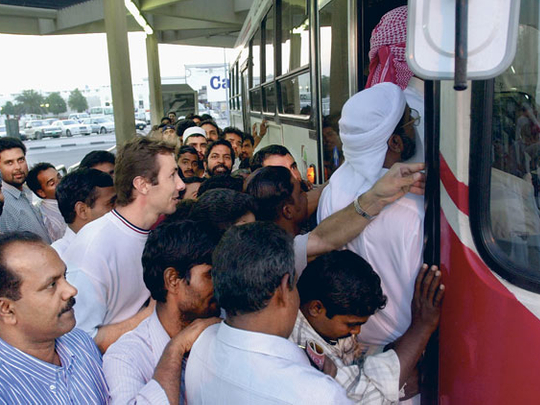
Dubai: A growing number of UAE residents are being pushed outside the city centre due to high housing costs, and they end up spending more out of their pockets on commuting and driving to work, according to an analyst.
Recent estimates show that about one million people who are employed by Dubai-based companies are opting to live outside the emirate, while a substantial number are residing in areas that don’t have easy access to trains in order to cut down on accommodation costs.
These long distance dwellers, many of whom brave through bumper-to-bumper traffic every day, may be saving money on rent, but they’re spending more on transport costs – and time – than they’re supposed to.
According to data compiled by market research firm Euromonitor International, the amount of money that people in the UAE spend on fares for taxis, including buses and coaches, reached Dh4 billion ($1.09 billion) in 2016 – roughly enough to buy more than 5,000 shiny new Rolls Royces. The figure is set to grow to Dh4.2 billion ($1.15 billion) this year, registering a 6.5 per cent increase.
At the same time, as suburban residents need private transport to get to work every day, billions of dirhams more go into spending on purchase of vehicles.
Euromonitor estimated that people who buy brand new and second-hand cars, motorcycles and other types of vehicles racked up a total of Dh17.6 billion ($4.8 billion) in sales receipts in 2016. By the end of the year, spending on vehicles will grow by about a Dh300 million more and hit Dh18.7 billion ($5.1 billion).
The research firm did not take into account consumer spending on petrol, maintenance costs, Salik fees, fines and other expenditures that come with long-distance driving to work.
It is believed that since the introduction of the Dubai Metro in 2009, coupled with the opening of new bus routes, a lot of people have ditched their cars. As of September 2016, the mass transit system recorded 830 million riders since 2009.
However, while the Dubai Metro has made commuting far easier for many residents, the high costs of housing within the city centre are pushing a substantial number of residents out of the emirate, which means living far from work is still costly for many professionals.
“Although Dubai Metro and additional bus routes connect various parts of the city, there are over one million people, according to Dubai Statistics Centre, who work in Dubai but reside outside the emirate due to higher living costs, a trend which has been growing over the past years,” Rabia Yasmeen, research analyst at Euromonitor International, told Gulf News.
“This segment of the population is self-reliant on cars and personal vehicles for their frequent travel needs within the country for work and with family.”
Properties near metro stops tend to be pricey, with annual rents costing tenants several thousands of dirhams more. A research conducted by advisory and consultancy firm ValuStrat in 2015 showed that asking rents near a metro station can be 10 per cent to 20 per cent more expensive.












